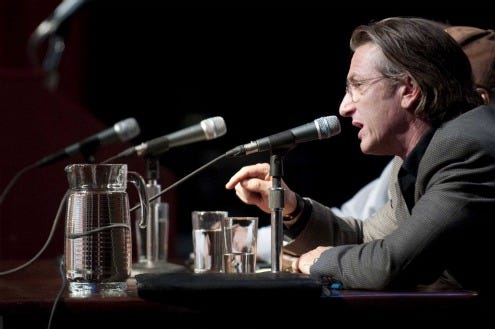Fair Game

Hot-button topics come in waves with Hollywood. Right no we have shifted into a lot of documentaries about the economic crisis and more narratives about the Iraq War. Just enough time has passed for a proper look can be made, but it’s still close enough to be emotional. The new Fair Game walks that line with the scandal involving Joe Wilson and his wife, who was improperly unveiled as a CIA agent.
That’s the premise, but it’s a long road to get there. Doug Liman and screenwriters Jez Butterworth and John-Henry Butterworth take their sweet time before Valerie Plame (Naomi Watts) is revealed to the world. She’s seen in the field and at the office. The film avoids the typical clichés by having her the greatest mission ever to prove she’s valuable. Instead it’s just business as usual.
The real shift in what’s going on is the new interest in Uranium sales. The White House wants to know what is going on in Iraq after the fear caused by 9/11. Joe Wilson (Sean Penn) is sent to Niger on a fact-finding mission. He comes back and reports there is no way they could have received the shipments. This and other information is contradicting the narrative Scooter Libby (David Andrews) so actions are made.
I’m simplifying a lot of things in the summary, but Fair Game takes its time and focuses on a lot of the details. Sometimes it oversimplifies. Andrews plays Scooter Libby like the Devil. There are a few dinner parties where Joe Wilson seems so progressive as opposed to his fearful friends but it seems more like it was something from hindsight.
Beyond those bumps, everything else is a fascinating tale. Watts is brilliant as she avoids the typical spy performance and works towards an incredibly subtle portrayal of disappointment. Penn is bigger—shocking!—but it works because Joe Wilson is very angry about what’s happening. He was someone who tried to use the news circuit to convey a sense of truth. He’s incredibly patriotic about the potential of the government, but knows there needs to be checks and balance.
As Joe tries to be an angry Mr. Smith and Valerine is internally struggling, there is some amazing tension. Their marriage is in trouble and the public is destroying their names. Liman was very smart to use as much archival footage as possible. To see the way stories were spun and went out of control had a lot of impact because Fair Game treats this as a very personal story.
Some of that personal aspect is cheapened by Liman’s handheld camera. This is a bit odd since this was the director of The Bourne Identity, the one Bourne film without that aspect. Despite that bad decision, this is his strongest movie in many years. This is a return to form because, once again, he had a really engaging story that was worth telling.


